Hoi An in Central Vietnam is the tailoring capital of the world and is home to over 500 tailor shops. Many of the annual five million visitors to this town leave with custom-made clothes.
When my partner and I visited Hoi An, we purchased custom-made dresses and a three-piece suit from two shops. Here, I share our firsthand tips on the process. This post covers:
- 💰 Hoi An tailor prices
- 👗 High-end vs. budget tailor shops
- 📏 The tailoring process
- 💡 Firsthand tips during the process
🇻🇳 Planning A Trip To Vietnam: 12 Practical Things To Know
5 Tips for Getting Tailored Clothes in Hoi An
If this is your first time getting clothes tailored in Hoi An, here are five essential tips.
All prices mentioned here are in USD 💵 .
🗓️ 1. You need at least two days to get tailored clothes in Hoi An.
Due to the competitive landscape, tailor shops will do their best to work with your schedule, but two days is the absolute minimum you need to get custom-made clothes in Hoi An. A two-day turnaround is feasible, but it’s tight and forces smaller shops to work overtime.
Giving tailors three or more days is more ethical and gives you better results by allowing them enough time to do more rounds of fittings and adjust your clothes accordingly. See the whole tailoring process below.
💭 2. Before stepping into a tailor shop, have an idea of what you want.
If you don’t know what you want, the tailoring process in Hoi An can be overwhelming. Like other big shops, Tuong Tailor has three floors worth of fabrics and dozens of lookbooks, so it can take hours to look through everything if you don’t have an initial idea.
Before visiting a tailor shop, one of the best things you can do is to have an idea of what you want made:
- Type of clothing item – formal dresses, jumpsuits, three-piece suits, etc.
- Basic design – halter top, asymmetrical, flare, etc.
- General color and pattern – navy blue, stripes, flowery pattern, etc.
It’s helpful to bring one to three visuals to convey what you want. I bookmarked some dresses I saw online to show my tailors.
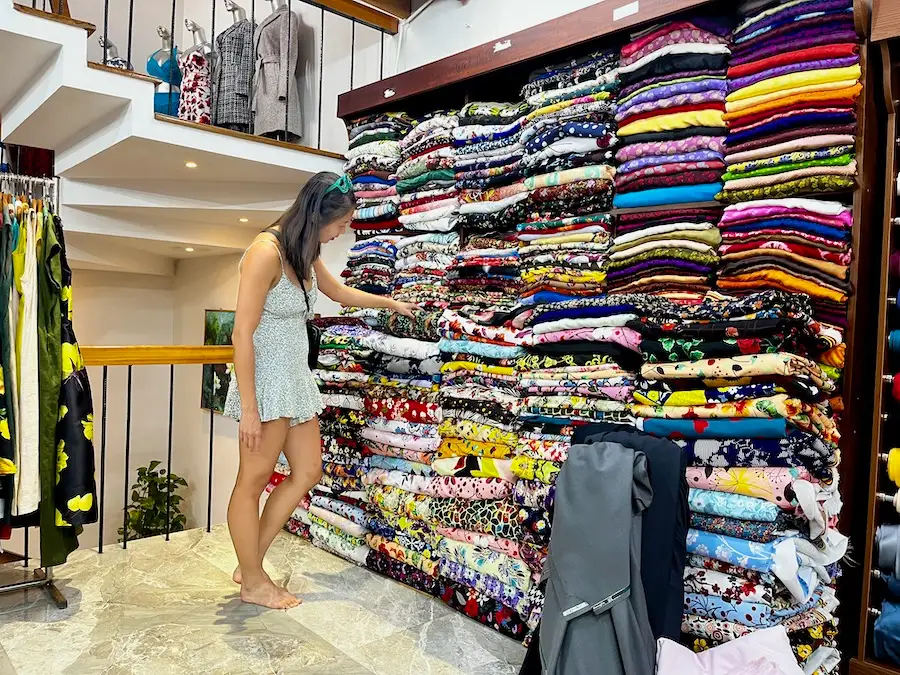
💰 3. Hoi An tailor prices scale with skillsets and customer service.
With over 500 tailor shops clustered primarily around Tran Hung Dao Street, you’ll find various options ranging from budget to high-end.
Most shops can do casual clothes, but you’ll want to reserve formal wear for the higher-end shops.
I got a dress at a smaller shop and two at Tuong Tailor, a bigger and more expensive shop. I compare the two shops below.
⏰ 4. Be flexible with how much time you’ll need for the tailoring process.
The time it takes for each tailor visit varies and depends on how busy the shop is, how many pieces you want, and how much guidance you’ll need.
For example, fitting appointments can be quick or take up to 45 minutes. Fitting depends on how many pieces you need to try on and how many adjustments you want or need, so be flexible when budgeting your time for these visits.
💳 5. Most shops have a 3% credit card fee.
If you’re getting multiple pieces of clothes made or are shopping at a higher-end tailor store, your total cost can easily be over $200, so the 3% credit card fee can add up.
Consider taking out cash to avoid the credit card fee. Shops will accept cash in US dollars or Vietnamese dong.
Most shops will also allow you to pay in full or roughly a 50% deposit during your first visit.
How Much Do Tailored Clothes Cost in Hoi An?
In Hoi An, you can find tailor shops that charge very different prices – anywhere from $5 to $300 for a custom-made piece.
If you’re visiting from a more affluent country, you’ll see that tailor shops charge very low to reasonable prices. Prices are almost always guaranteed to be lower than what you can get for the same quality in the United States or other Western countries.
Hundreds of online reviews on Hoi An tailors suggest that you can get a dress or bespoke suit for 10% to 30% of the cost that you would get in the United States.
💰 Average Prices at Hoi An Tailors
Here’s what you can expect to pay at a Hoi An tailor for a custom-made piece:
| Clothing Piece | Budget Tailors | High-End Tailors |
|---|---|---|
| Button-down shirt | $10 – $30 | $30 – $50 |
| Short dress | $15 – $40 | $70 – $100 |
| Long dress | $20 – $50 | $90 – $150 |
| Three-piece suit | $90 – $150 | $200 – $400 |
Below is a more detailed comparison between budget and high-end tailors.
👗 How Much We Paid for Our Custom Clothes
My partner and I got several custom-made pieces at two Hoi An tailor shops: Tuong Tailor, a highly-rated shop, and a budget shop with no Google reviews.
Below are the clothing pieces we got tailored and how much we paid for each one. The long dress came from the budget shop, and everything else was from Tuong Tailor.
| Custom-Made Piece | Price |
|---|---|
| Short dress #1 | $80 |
| Short dress #2 | $90 |
| Long dress | $35 |
| Suit jacket & trousers | $230 |
| Suit vest | $80 |
| Dress shirt | $40 |
| Tie #1 | $10 |
| Tie #2 | $10 |
We didn’t negotiate, so these were the initial prices we were quoted and how much we paid. In total, we spent:
| What We Got | Total Cost |
|---|---|
| Women’s dresses (3x) | $205 |
| Men’s three-piece suit (1x) | $370 |
| Total | $575 |
Vietnam is one of the cheapest countries to visit, so custom clothes easily became one of my biggest expenses. I detail all my expenses in this Vietnam trip cost breakdown.
💰 How Prices Are Determined at Hoi An Tailors
The price of tailored clothes in Hoi An depends on several factors, and you can control several of these things to help decrease or increase your price tag:
1. Type of Tailor Shop
Most tailor shops in Hoi An are low to medium budget, while a few, like Tuong Tailor, BeBe Tailor, A Dong Silk, and Yaly Couture, are high-end. Unsurprisingly, the latter are some of the best tailor shops.
You can get an idea of what kind of shop they are by looking at Google and Tripadvisor reviews or just by looking at how big or nice the storefront is in person.
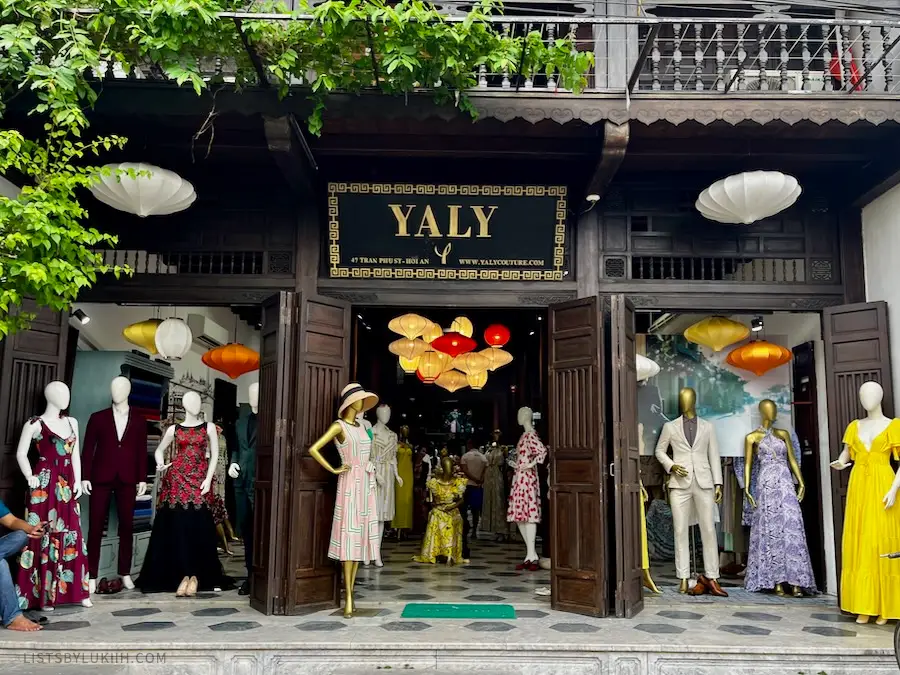
2. Complexity and Material Needed
The more complex the clothing design, the more it’ll cost. More material (e.g., double layers instead of one, a long dress instead of a short one) will also lead to higher prices.
For example, a small shop quoted $20 for a short dress and $35 for a long dress. At a bigger shop, a short dress was $80, while the long dress was over $100 for one fabric. A short dress with two different fabrics bumped the cost up to $95.
3. Fabric Quality
The biggest tailor shops will have hundreds of fabrics, ranging from decent to high quality. The kind of fabric you choose will significantly impact the price.
At Tuong Tailor, a short dress made with the standard fabric started at $70. However, if I wanted to use higher-quality fabrics without changing the dress’s design, the price increased to $100 or $150.
4. Number of Pieces You Purchase
Many tailor stores in Hoi An will be willing to give you a higher discount the more pieces you purchase from that shop.
You can try negotiating if the Hoi An tailor shop doesn’t proactively offer a discount. Bargaining is expected and part of the norm in Hoi An.
Budget vs. High-End Tailor Shops in Hoi An
Is paying for a high-end tailor shop in Hoi An worth it? The answer to that varies by person.
For some initial guidance, below are some differences I experienced between the budget shop with no Google reviews and Tuong Tailor, the bigger, highly-rated shop.
I am not paid by Tuong Tailor for my review. All opinions expressed here are my own and reflect my personal experience.
💰 1. The Price Tag
The price tag varies significantly between a budget and a high-end tailor shop. The difference may not be worth it for a casual piece, but it may be worth it for a formal one.
Here are the standard prices I was quoted for the same dress designs:
| Shop | Short Dress | Long Dress |
|---|---|---|
| Budget | $20 | $35 |
| High-end | $80 | $100 |
🧠 2. Skillset and Willingness to Adjust
The budget and high-end tailor shops differed significantly in skillset and the level of guidance they provided.
During my fitting, the budget shop primarily asked me what I wanted to be changed and seemed resistant to some of the changes I wanted, while Tuong Tailor proactively identified adjustments, regardless of the complexity, to get a perfect fit.
The small shop did one fitting, while the big shop did two fittings for each piece in the same span of time, and the latter executed the adjustments much more professionally and with better outcomes.
👔 3. Fabric Options
Since the budget shop was much smaller, they had a smaller selection of fabrics. In contrast, Tuong Tailor had three floors worth of fabric, and each floor was bigger than the entirety of the smaller shop.
If you find fabric you like at a small shop, a wider selection may not matter as much. But remember that bigger shops also have a wider range of fabric quality.
🚰 4. Facilities
The small shop didn’t have a changing facility (e.g., getting fitted meant going to the back room without a door). Tuong Tailor, however, had a separate section with individual changing rooms and giant mirrors.
The facilities don’t necessarily impact the quality of your clothes, but they can change your experience if that’s important to you.
✋🏻 5. Number of workers
The small shop had one person, while Tuong Tailor had at least ten employees. Although I mainly worked with one person at Tuong Tailor, someone was always available to help me during all visits if my primary contact was busy.
In the small shop, I sometimes had to wait for the one employee to finish taking care of other customers first.
🍀 Lukiih’s Take
Given the drastic price differences, is paying for a higher-end tailor shop worth it?
Based on my experience, I recommend getting casual clothes at the smaller, budget shops and formal wear with more complicated designs at the bigger, high-end shops.
Overall, I was happy with my two dresses from Tuong Tailor, and I’ve since worn them for formal events. In comparison, I wasn’t satisfied with the budget shop’s finished product because it wasn’t quite what I asked for and didn’t fit me that well.
Like the bigger shop, the small shop was very professional. It’s not that I wouldn’t buy from them again; I would just do casual clothes with them next time.
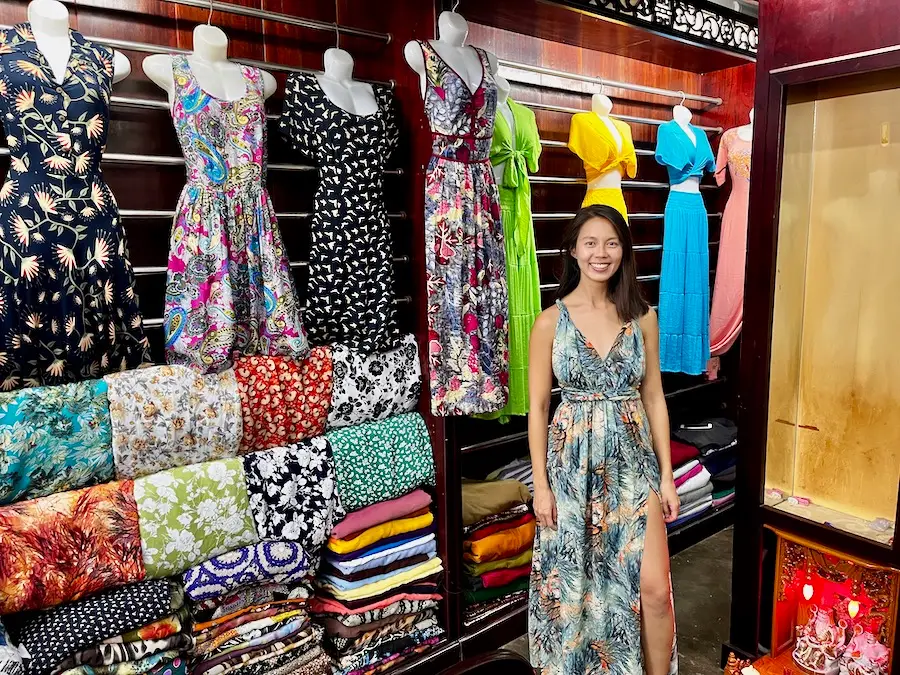
The Tailoring Process in Hoi An
All the Hoi An tailor shops typically follow the same process outlined below.
I specifically use my experience with Tuong Tailor in the examples, but the smaller shop followed a similar process with less guidance and one less round of fitting.
Step 1: Research before entering a tailor shop.
💡 What To Expect
Before starting the tailoring process, the general wisdom is to:
- Brainstorm – Have an idea of what you want made.
- Research – Do some online research on potential tailor shops in advance
You should at least come in with some visuals for inspiration and to help communicate what you want.
🍀 Lukiih’s Experience
Here’s my experience with step 1 of the tailoring process:
- Design research – I wanted two short dresses for weddings and date nights and had an idea of general designs (e.g., one asymmetrical, one halter top). However, I didn’t have a color or fabric in mind, which made the process take longer.
- Tailor shop research – I did light research and saved two tailor shops that seemed well-reviewed on Google (i.e., 4.0+ stars with 100+ reviews). I ended up not using them; I just walked around Hoi Ai and went to stores that caught my eye or seemed to offer what I wanted.
Having an idea of what you want is more important than doing advanced research on tailor shops. Unless you know you want a specific high-end tailor store, walking around Hoi An and looking up reviews on the go is good enough.
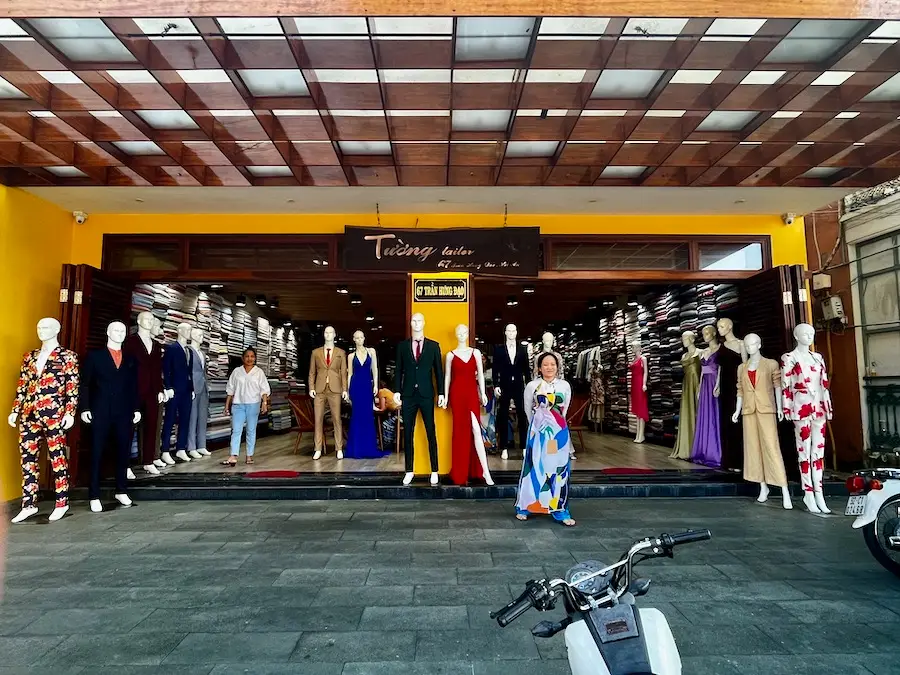
Step 2: Visit a shop and agree on what you want made.
💡 What To Expect
Select a tailor shop and work with them to describe what you want. This step includes selecting a design and then a fabric.
You’ll also get measured, agree on a price, pay a deposit, and set a time to get fitted, usually sometime the following day.
The first visit to a tailor shop is usually the longest (45 to 60 minutes), depending on how set you are on your design (if you’re unsure about the design and fabric, it’ll take longer to discuss and select one), how complex it is, and how many pieces you’re getting made.
🍀 Lukiih’s Experience
Here’s my experience with step 2 of the tailoring process:
- Describing the dress style – I showed my tailor two photos and verbally communicated things I wanted different (e.g., no ruffles on the asymmetrical dress, short hem, and no slit on the halter top). She took a photo of my visuals and asked clarifying questions.
If you don’t come in prepared with visuals of what you want, some stores will give you a somewhat limited “lookbook” for inspiration, ask you to point at dresses you like around the shop, or ask you to Google some visuals to show them.
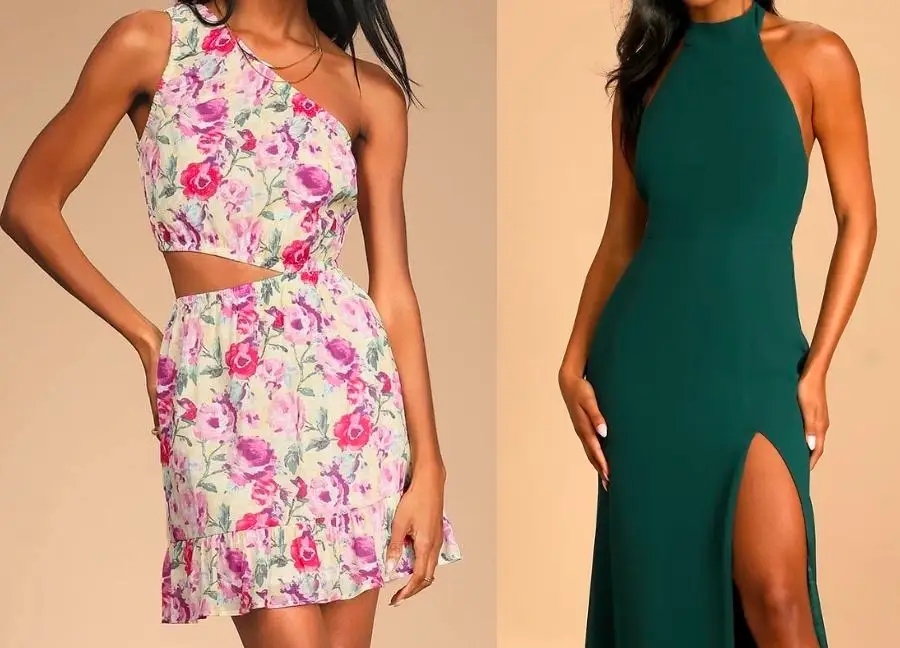
- Choosing a fabric – I got overwhelmed with the choices because I didn’t come in with even a dress color in mind. Tuong Tailor had over three floors worth of fabric. I spent over an hour looking through all the color options and patterns before picking one. Thankfully, the tailor was very patient with me.
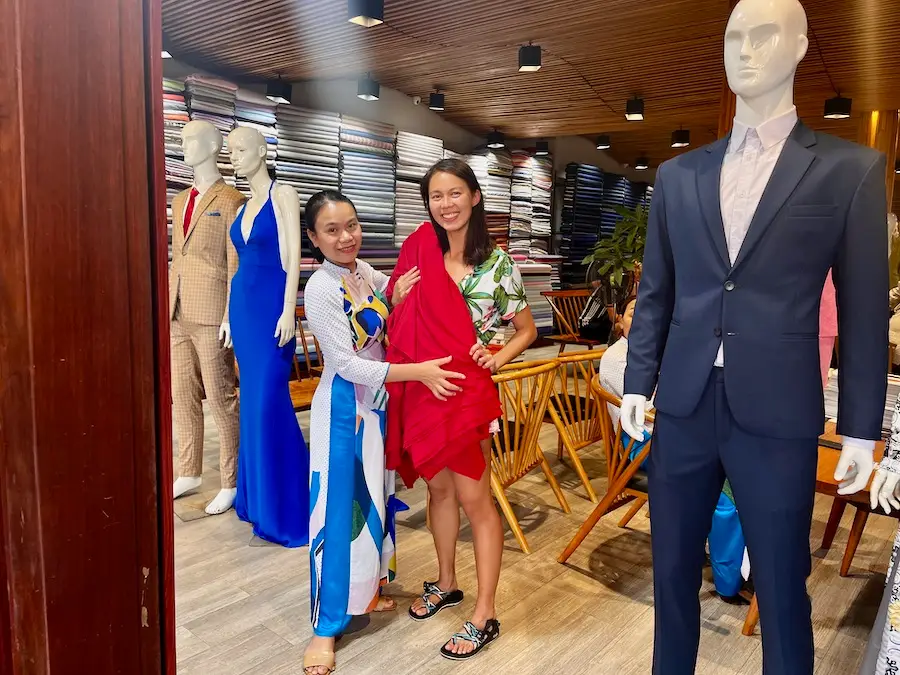
- Getting measured – This was straightforward and took about a minute.
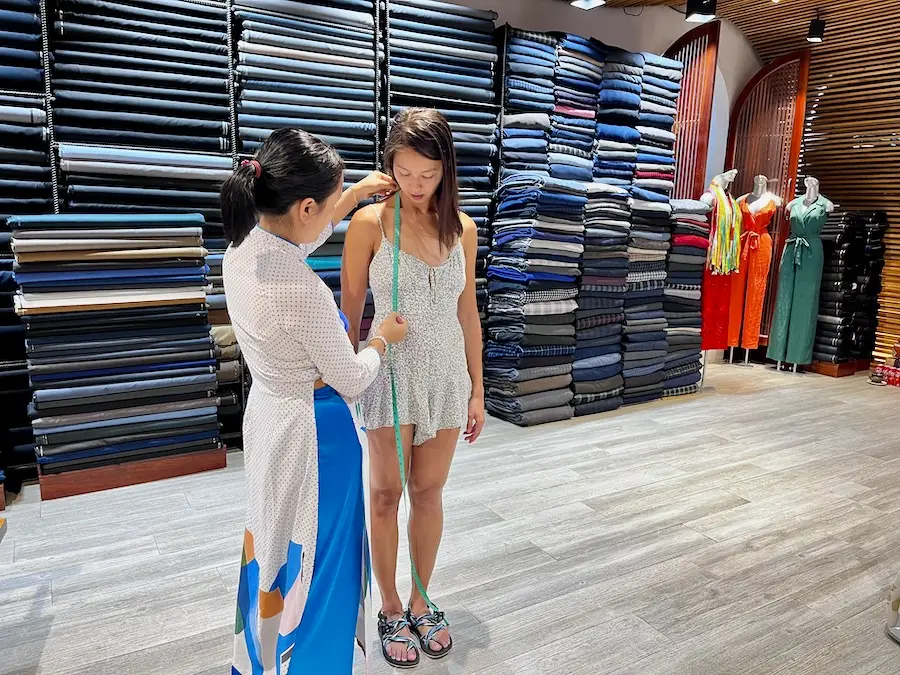
- Agreement on the next steps – The tailor gave me a price, and I agreed without negotiating. I paid half the deposit using a credit card. I confirmed I could return for my first fitting at 1 pm the next day, about 20 hours later.
Step 3: Get fitted and make adjustments.
💡 What To Expect
Your piece will be 80% to 90% done during your first fitting. You’ll put it on and discuss any desired adjustments with your tailor.
Then, you’ll agree on a time for your next fitting, usually less than 24 hours later.
Getting fitted can take 15 to 45 minutes, depending on the number of other customers at the shop, the number of adjustments you have to make, and the number of pieces you’re trying on.
🍀 Lukiih’s Experience
Here’s my experience with step 3 of the tailoring process:
- Getting fitted – After I put on my dress, the tailor proactively identified adjustments that needed to be made and confirmed with me that I agreed with the adjustments. They also asked if I wanted to make other modifications.
Two pro tips I learned while getting fitted:
1. Wear the bra you think you would wear with the dress for the most accurate fit. I didn’t do this, and now my dress is a tad tighter around the bust area with a different bra.
2. Ask for shoulder hanging straps to be included. Mine didn’t come with any, making the dresses harder to hang when I brought them home.
- Adjustments – I had three to four adjustments made per dress, and they included:
- Loosening/tightening the bust area
- Shortening the hemline
- Tightening the waist area
- Making the neck collar thinner (for the halter top)
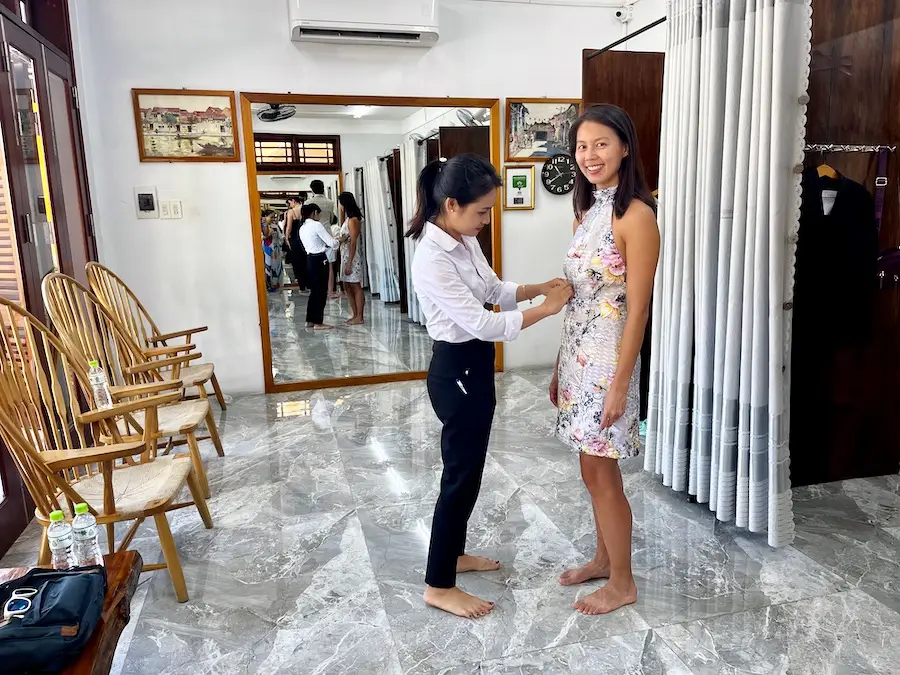
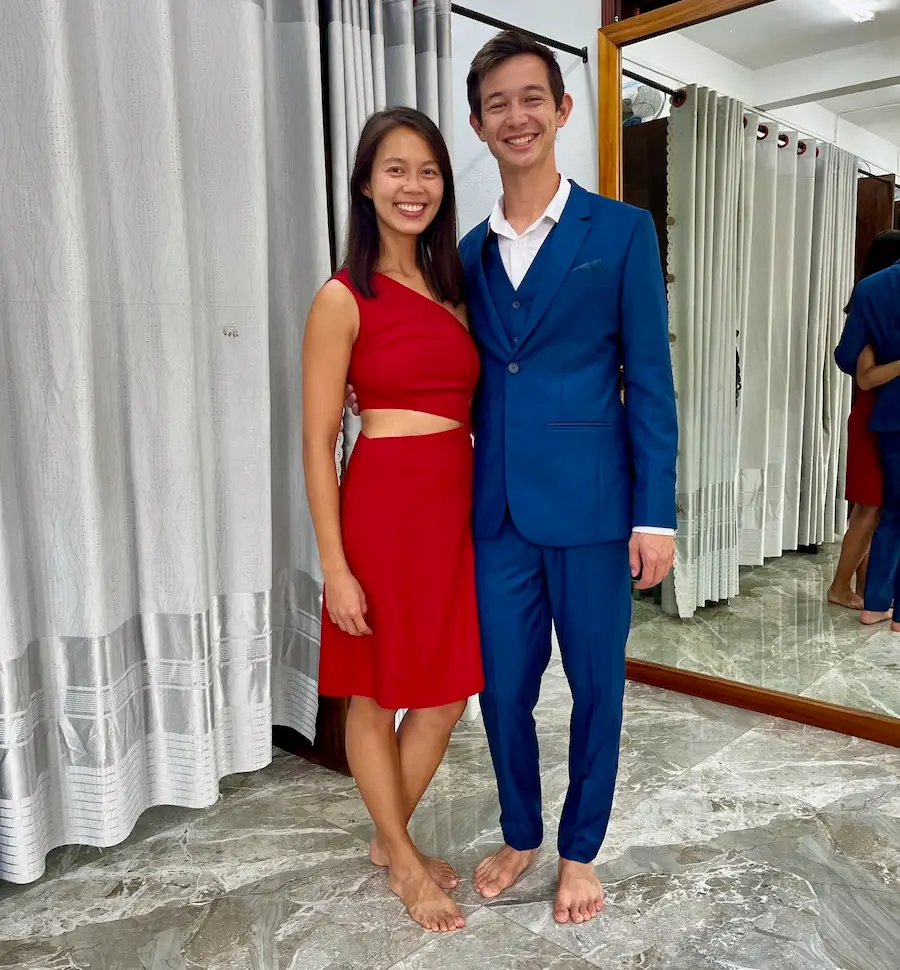
Step 4: Do the final fitting and pick up the clothes.
💡 What To Expect
The last step is to get fitted again and make any necessary adjustments. You then pay the full amount and pick up the final product.
🍀 Lukiih’s Experience
Here’s my experience with step 4 of the tailoring process:
- Final fitting – This part was the same as step 3 but with smaller adjustments.
- Clothes pickup – Once I was satisfied, I paid, and they packaged the clothes in a plastic bag for me to take home.
Most custom-made clothes can be done in about three to four days. If you want a more complicated piece, like a wedding dress, it can take a long time (e.g., over five days).
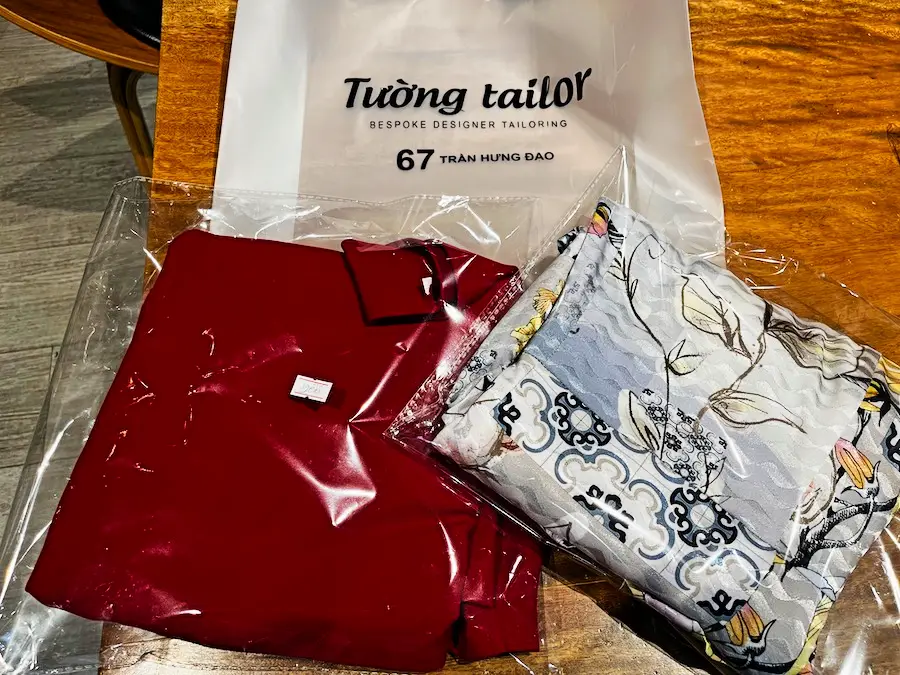
Is Getting Tailored Clothes Worth It in Hoi An?
My recommendation is to get a clothing piece designed and tailored specifically for you in Hoi An for any of these reasons:
- You want to take advantage of the quality-to-price ratio – With due diligence, you’ll get a high-quality piece for a very affordable price, especially if you negotiate. It’s challenging to find the quality-to-price ratio offered by the professional tailors in Hoi An, which is why it’s known as the tailoring capital of the world.
- Fun and unique experience – If you get along with your tailor, it can be a fun and unique experience. Ensure you feel comfortable working with your tailor, as you will negotiate adjustments with them during fitting. I asked to switch my primary point of contact during my first session and had better chemistry with the second person.
- It’s worth it if you want something with a better fit – Dresses and suits are the most valuable things to get tailored, but even if you don’t generally need nicer clothes, getting more casual clothes that require a better fit can be worth it (e.g., jumpsuits, rompers, a matching couple outfit).
Last thing to note: If you have no space to carry your clothes back, some shops will offer to ship your clothes. This option is likely worth considering if you’re getting multiple nicer pieces.
When Should You Not Get Tailored Clothes in Hoi An?
If you don’t have at least two days in Hoi An, consider skipping the tailoring process.
Due to high competition, many tailor shops will work odd hours to meet customers’ schedule demands. Requiring a shop, especially a small one, to turn your clothes around in less than two days can be unethical, and you risk getting a worse result.
Hoi An is also known as the food capital of Vietnam. In addition to getting clothes tailored, you can take a highly-rated cooking class or go on a five-star food tour.
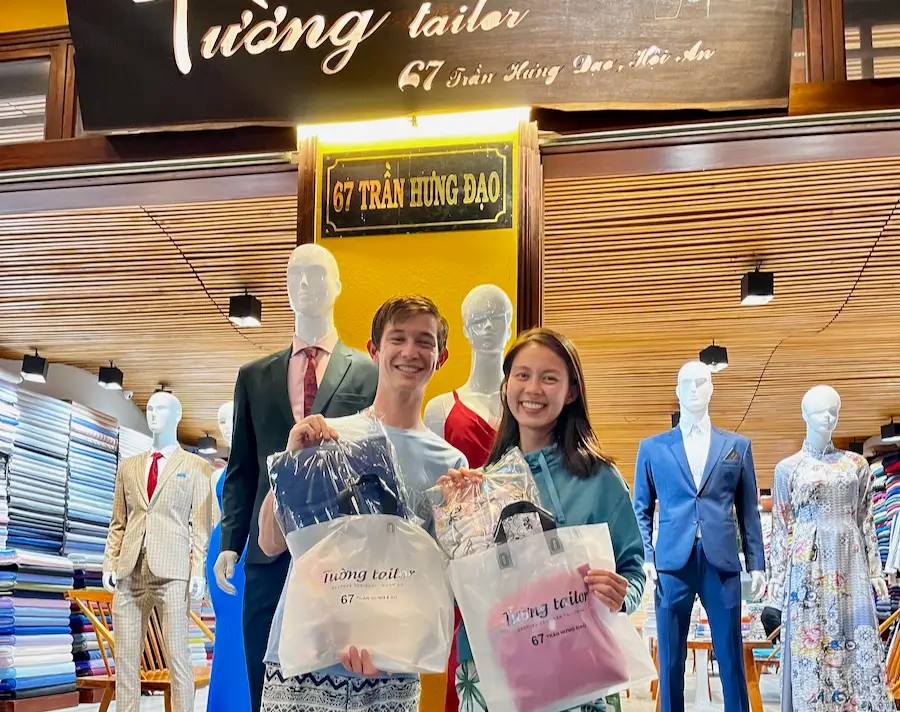
Vietnam Trip Planner 2025
Make planning easier with my flexible, research-backed travel planner—shaped by real experience. It has:
- Up-to-date travel info
- A well-curated itinerary
- Practical, firsthand insights & tips
- A simple budget tracker
- A starter packing list
- Fully customizable sections
Built in Notion, this is the tool I personally use to plan every trip. I genuinely love it and creating a Notion account is free.
Lists by Lukiih is a small site I fund myself. Downloading my trip planner is the best way to support me and keep it running—thanks!
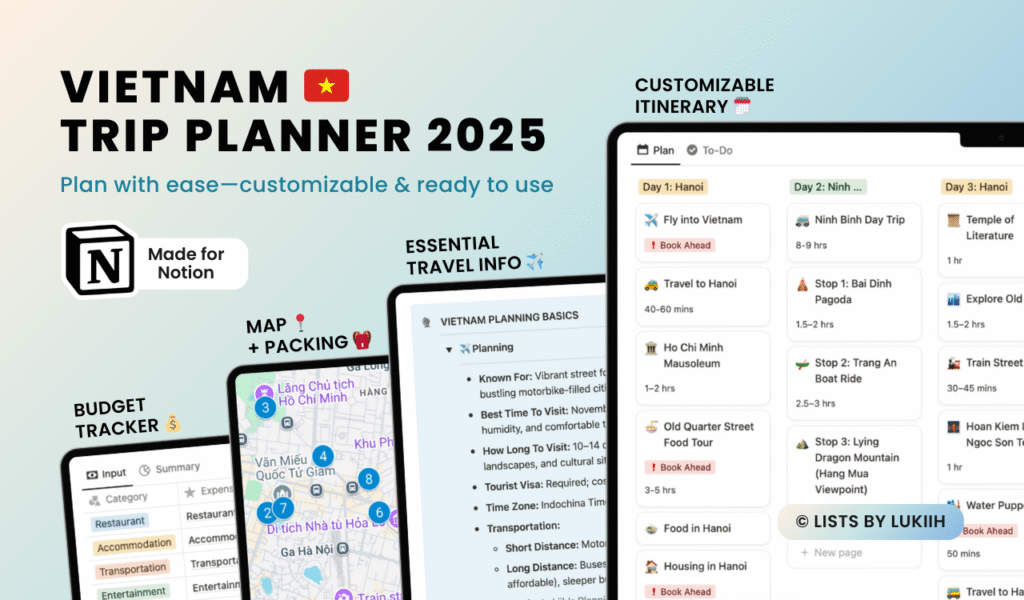
Vietnam Travel Guides
- 🇻🇳 Planning A Trip To Vietnam: 12 Practical Things To Know
- ⛰️ 10 Epic Days in Vietnam: A Unique & Active Itinerary
- 💰 My Vietnam Trip Cost: Budget Breakdown (2025)
- 🍜 Hanoi Guide: 14 Great Things To Do, Eat and Skip
- 🏍️ Ha Giang Loop: Firsthand Review & Tips
- 🧗♀️ Deep Water Solo in Vietnam: Firsthand Review & Tips
- 🏮 Hoi An Guide: 11 Great Things To Do + 3-Day Itinerary
- 👗 My Hoi An Tailor Experience: Prices & What To Know